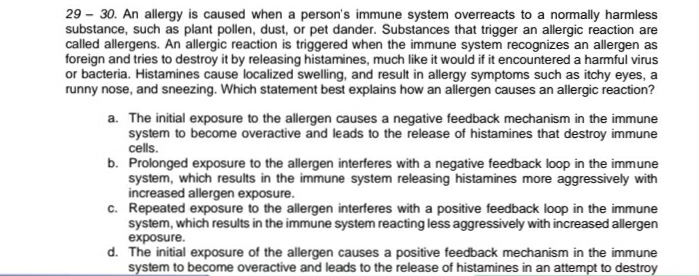30. An allergy is caused when a person's immune system overreacts to a normally harmless substance, such as plant pollen, dust, or pet dander. Substances that trigger an allergic reaction are called allergens. An allergic reaction is triggered when the immune system recognizes an allergen as foreign and tries to destroy it by releasing histamines, much like it would if it encountered a harmful virus or bacteria. Histamines cause localized swelling, and result in allergy symptoms such as itchy eyes, a runny nose, and sneezing. Which statement best explains how an allergen causes an allergic reaction? a. The initial exposure to the allergen causes a negative feedback mechanism in the immune system to become overactive and leads to the release of histamines that destroy immune cells. b. Prolonged exposure to the allergen interferes with a negative feedback loop in the immune system, which results in the immune system releasing histamines more aggressively with increased allergen exposure. c. Repeated exposure to the allergen interferes with a positive feedback loop in the immune system, which results in the immune system reacting less aggressively with increased allergen exposure. d. The initial exposure of the allergen causes a positive feedback mechanism in the immune system to become overactive and leads to the release of histamines in an attempt to destroy
30. An allergy is caused when a person's immune system overreacts to a normally harmless substance, such as plant pollen, dust, or pet dander. Substances that trigger an allergic reaction are called allergens. An allergic reaction is triggered when the immune system recognizes an allergen as foreign and tries to destroy it by releasing histamines, much like it would if it encountered a harmful virus or bacteria. Histamines cause localized swelling, and result in allergy symptoms such as itchy eyes, a runny nose, and sneezing. Which statement best explains how an allergen causes an allergic reaction? a. The initial exposure to the allergen causes a negative feedback mechanism in the immune system to become overactive and leads to the release of histamines that destroy immune cells. b. Prolonged exposure to the allergen interferes with a negative feedback loop in the immune system, which results in the immune system releasing histamines more aggressively with increased allergen exposure. c. Repeated exposure to the allergen interferes with a positive feedback loop in the immune system, which results in the immune system reacting less aggressively with increased allergen exposure. d. The initial exposure of the allergen causes a positive feedback mechanism in the immune system to become overactive and leads to the release of histamines in an attempt to destroy
Human Physiology: From Cells to Systems (MindTap Course List)
9th Edition
ISBN:9781285866932
Author:Lauralee Sherwood
Publisher:Lauralee Sherwood
Chapter12: Body Defenses
Section: Chapter Questions
Problem 1SQE
Related questions
Question

Transcribed Image Text:29 - 30. An allergy is caused when a person's immune system overreacts to a normally harmless
substance, such as plant pollen, dust, or pet dander. Substances that trigger an allergic reaction are
called allergens. An allergic reaction is triggered when the immune system recognizes an allergen as
foreign and tries to destroy it by releasing histamines, much like it would if it encountered a harmful virus
or bacteria. Histamines cause localized swelling, and result in allergy symptoms such as itchy eyes, a
runny nose, and sneezing. Which statement best explains how an allergen causes an allergic reaction?
a. The initial exposure to the allergen causes a negative feedback mechanism in the immune
system to become overactive and leads to the release of histamines that destroy immune
cells.
b. Prolonged exposure to the allergen interferes with a negative feedback loop in the immune
system, which results in the immune system releasing histamines more aggressively with
increased allergen exposure.
c. Repeated exposure to the allergen interferes with a positive feedback loop in the immune
system, which results in the immune system reacting less aggressively with increased allergen
exposure.
d. The initial exposure of the allergen causes a positive feedback mechanism in the immune
system to become overactive and leads to the release of histamines in an attempt to destroy
Expert Solution
This question has been solved!
Explore an expertly crafted, step-by-step solution for a thorough understanding of key concepts.
This is a popular solution!
Trending now
This is a popular solution!
Step by step
Solved in 2 steps

Knowledge Booster
Learn more about
Need a deep-dive on the concept behind this application? Look no further. Learn more about this topic, biology and related others by exploring similar questions and additional content below.Recommended textbooks for you

Human Physiology: From Cells to Systems (MindTap …
Biology
ISBN:
9781285866932
Author:
Lauralee Sherwood
Publisher:
Cengage Learning

Anatomy & Physiology
Biology
ISBN:
9781938168130
Author:
Kelly A. Young, James A. Wise, Peter DeSaix, Dean H. Kruse, Brandon Poe, Eddie Johnson, Jody E. Johnson, Oksana Korol, J. Gordon Betts, Mark Womble
Publisher:
OpenStax College

Human Heredity: Principles and Issues (MindTap Co…
Biology
ISBN:
9781305251052
Author:
Michael Cummings
Publisher:
Cengage Learning

Human Physiology: From Cells to Systems (MindTap …
Biology
ISBN:
9781285866932
Author:
Lauralee Sherwood
Publisher:
Cengage Learning

Anatomy & Physiology
Biology
ISBN:
9781938168130
Author:
Kelly A. Young, James A. Wise, Peter DeSaix, Dean H. Kruse, Brandon Poe, Eddie Johnson, Jody E. Johnson, Oksana Korol, J. Gordon Betts, Mark Womble
Publisher:
OpenStax College

Human Heredity: Principles and Issues (MindTap Co…
Biology
ISBN:
9781305251052
Author:
Michael Cummings
Publisher:
Cengage Learning

Biology 2e
Biology
ISBN:
9781947172517
Author:
Matthew Douglas, Jung Choi, Mary Ann Clark
Publisher:
OpenStax

Human Biology (MindTap Course List)
Biology
ISBN:
9781305112100
Author:
Cecie Starr, Beverly McMillan
Publisher:
Cengage Learning

Biology (MindTap Course List)
Biology
ISBN:
9781337392938
Author:
Eldra Solomon, Charles Martin, Diana W. Martin, Linda R. Berg
Publisher:
Cengage Learning